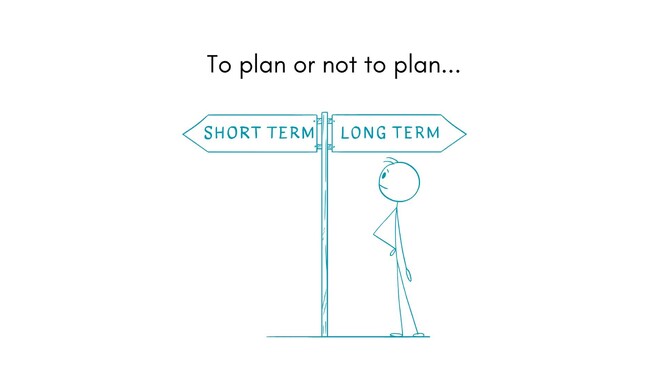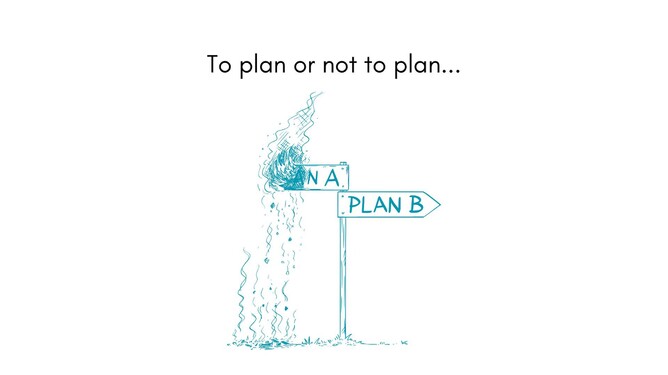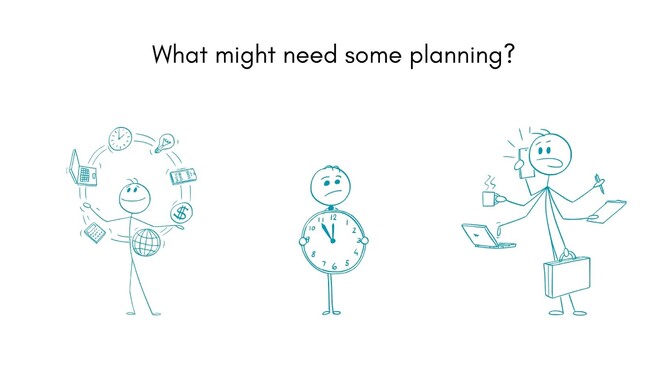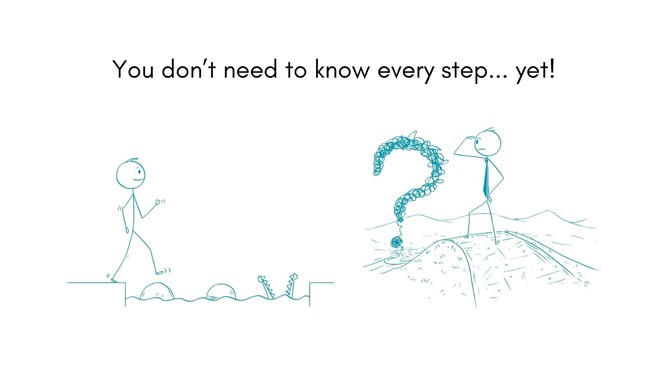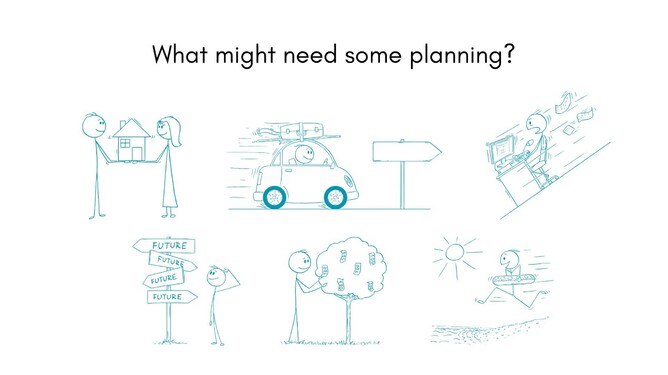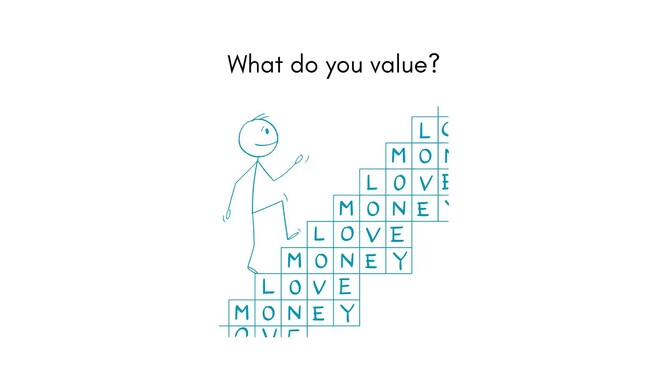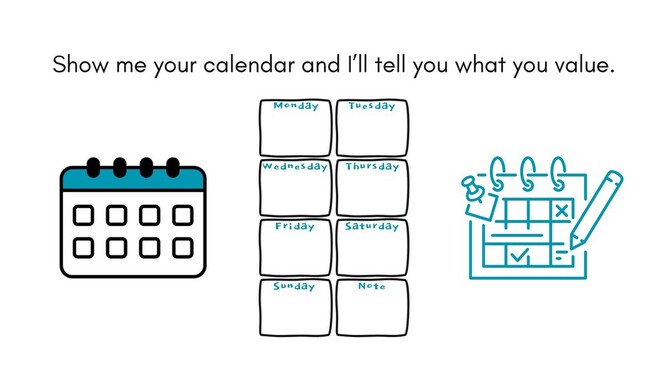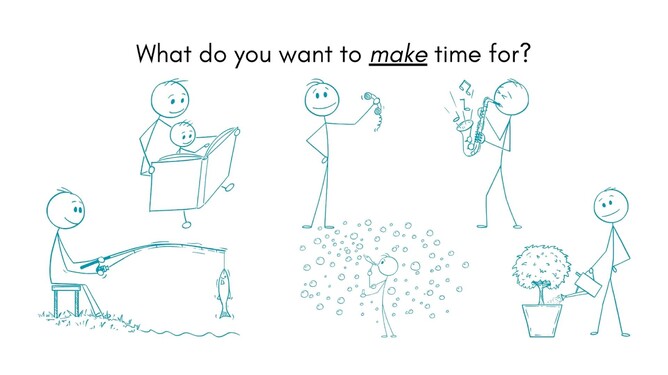… that is the question. Or is it? Is it a question at all? As someone who works in sport, where training, performances and life around those are planned in four-year cycles and as someone who has lived that life as an athlete, I am quite obviously biased towards living a life that includes planning. I planned as a teacher too, because, in my view, it is impossible to get the best out of people, if you have no idea of where you want them to get to and what you want them to learn along the way. And then there are all my personal plans and projects that I plan for too…
I am making an assumption here about you, my dear readers, and my guess is, that if you are taking the time to read this blog, you are somewhat interested in being deliberate in life, which means you are already halfway down the planning route… so keep going. Today’s blog is focused on planning your time. There are obviously other things you can plan, like your meals, the layout of furniture for your room, or the outline of your next blog post, for example. But today is about your time.
The end of the year, Christmas and New Year's, is a natural point where many reflect. This year, more than any other year, I’ve heard people ask each other, ‘Do you make New Year's resolutions?’, rather than simply assuming that everyone does. It’s refreshing. I, for one, am not a great fan of New Year's resolutions. This is largely because my perceived end of the year was more like August or September for so many years. And it made much more sense to make resolutions and commitments then. But calling them Two-Thirds-Through-The-Year resolutions somehow doesn’t roll off the tongue easily…
So, do I have goals, aspirations and ideas? Yes. Do I commit to them around New Year’s? No, not usually. I do, however, use the time between Christmas and New Year’s to reflect and start making some plans for the new year, with my goals and aspirations in mind. As the saying goes:
If you fail to plan, you plan to fail.
There is quite a bit of truth to that. Some things are much easier done if planned and much easier achieved if they are thought through. I’m not suggesting you plan every minute of every day, though you can if you like. I don’t plan that much either. But I use the end of the old year and the start of the new year to check in and see if my structures still work, if they still serve me well, if they still help me live the life I want to live and if they still help me head in the general direction of my ambitions. If they do, great. They get to stay a bit longer. If they don’t, it’s time to replace them.
Here is an incomplete list of the kinds of things I plan or review at the start of the year:
General number of holidays or trips for the coming year and the destination(s)
Times when I will see my people (friends & family)
Major events for friends and family
Exercise
Progress on my personal projects
You can already see that I am making and reviewing plans for different periods here. I like to have a general idea of what trips and holidays I have coming up, one, because I love the anticipation before a trip, and two, it is good to know when I will get or take a break. Also, it helps anyone else whom I might visit plan too. Now, note that I don’t usually have it all planned by January. I just know roughly what I will do trip-wise during that year. That doesn’t mean things are booked and locked in. Yet. If you, like me, live far away from many of your loved ones and family, you’ll understand that it takes more planning to ensure you see them all. So for these plans, I take more of a year-long perspective.
Then there are some of the more medium-term plans, like key trips and events to see and support friends, competitions I want to attend to support athletes, and work phases that will be busy and thus will require a little extra attention. So at the start of the year, I look at what those events are, where they are across the next few months and where there might be a clash of my personal and professional schedules, as well as how that fits with friends’ plans. Naturally, your personal situation influences what you can and cannot plan. If you have a partner, it makes sense to do some of your planning together. If you have young-ish kids, it makes sense to include their commitments in your plans, etc. You’ll know best what is useful to consider and what is not when you are making your plans.
While I do some rough long- and medium-term planning, my most detailed planning is my weekly planning. And this, I can highly recommend. At the end of each week, usually Sunday night, I’ll sit down and look at the next week. I create a short written plan for what is coming up. Over the years, the format I do this in has changed from using a notepad with a weekly overview to using a weekly calendar notebook, to lists and back to calendars. It doesn’t matter so much what you use to plan. What is more important, I think, is that you plan and find a way that works for you. I prefer handwriting these as there seems to be a stronger connection to my memory when hand-writing the plan. Here are some of the things I put into the weekly plan:
Daily exercise - what activity and when
Catch-ups with my people, via phone or in person
Time for my little projects (eg. writing this blog)
Any important or out-of-the-ordinary work events
Trips or days away
Any other events that week I want to remember, eg. birthdays
I like to think of planning as decision-making in advance. I decide what I will do and what is needed for me to feel well, show up the best way I can that week, what the next steps are to move my personal projects along, etc. well in advance. I do this because as the week progresses I might get increasingly tired and I know I don’t make my best decisions when I am exhausted. So instead of getting to Thursday afternoon and deciding whether or not I feel like going for a run now or not (spoiler alert: I won’t feel like it. At all.), I make the plan early and then I follow it. Of course, there is flexibility, and if unexpected things come up, I’m quite happy to change the plan or throw it out altogether.
So, think about what you want to make time for. What do you want to do? What do you need to do to move a personal or professional project forward? If you have a highly scheduled life, like I used to have and like lots of the athletes I work with do, it can be useful to schedule unscheduled time. So when I work through a weekly plan like this with clients or athletes and someone enjoys periods where they don’t have a plan, we put that sort of unstructured time into their weekly, monthly or yearly plan.
The other things I write on my plan are my values and the progress I aim to make with my personal projects each week. I write down my values weekly to keep them at the forefront of my mind, but also so I can check my plan against them immediately. The core values I use currently are Excellence, Growth, Contribution and, and if I do those three well, the fourth one, Integrity, will take care of itself.
I have my personal definition for each one of these values. For example, excellence, to me, means doing the best I can, with the skills and resources I have in any given situation. In addition to that, and this is important to me, it has to be repeatable. So in striving for excellence, I aim to build my skill set to a high level, so that I can repeat high-quality performances and work. You can see how this is closely linked with growth, though growth for me also extends to supporting the growth of other people. This is my definition, it doesn't have to be yours. Anyway, you get the idea. You'll have your own values and I encourage you to think about them while you plan.
This isn’t a blog about figuring out your values, though I wanted to share the idea that this is a way to actively use your values and refer to them regularly. I use my values weekly when I put together the plan. It allows me to check whether I have allocated time to live my values. Have I made time for growth? My own and that of people around me? Am I learning something or aiming to get better at something this week? Am I sharing what I know? Am I helping others grow and get better at what they do? If the answer is ‘yes’, then I have made time to live this value. Great. If not, I usually see if I can make time for that in my plan.
Another way to think about it is this:
Show me your calendar and I’ll tell you what you value.
If I looked at yours, what would I see?
Many of us spend a lot of time at work. That is not to say that work is what we value most. It is what is required for many of us to be able to pay rent and buy food. So the overall amount of time you spend or plan to spend on doing something is not necessarily a reflection on how much you value it.
For example, I have a few phone calls with friends and family each week. They are locked into my plan and, unless one of us is unavailable, they are non-negotiable in my weekly plan. I want to take those calls because these people matter to me and I need them because the conversations make me feel good. So I make time for them. Naturally, I spend less time on the phone with loved ones than at work, even though they are more important to me… So the amount of time is not necessarily an indication of how much or how little you value something. But whether or not you make time for something, however much or little, should tell you enough about what you value.
So, whether you already plan or not, give this a go: Look at your plan with your values in mind and see what you make time for.
Obviously, I don’t always get this right. There are moments or days or weeks, even, where I don’t manage to live my values at all, or not to the level I would like to. And while frustrating at the time, that is ok. What planning with your values in mind means though is that you, as much as you can, set yourself up to be able to live your values. You stack the odds in your favour.
Happy New Year everyone. I hope today’s blog has made you think. Thank you for reading it all. I appreciate you taking the time. If you think someone else might find this useful, please share it with them. As always I would love to hear from you. Send me a message on Instagram @mankertina.
Key Points:
Planning is decision-making in advance.
Planning frees you up to think more clearly when you are tired.
Planning can support you in living your values.
Reflection Questions:
How do you plan? Short-, medium-, long-term? What does your plan include? Do you have a written plan, etc.?
If you showed someone your calendar for the next two weeks, what would they think are the top three things you value?
To what extent have you considered your values when putting together your plans for the year, month, week, day?
